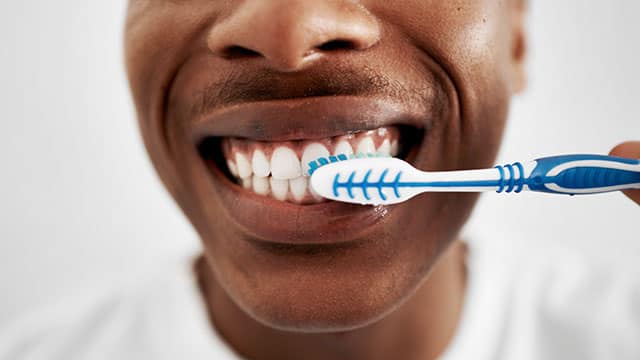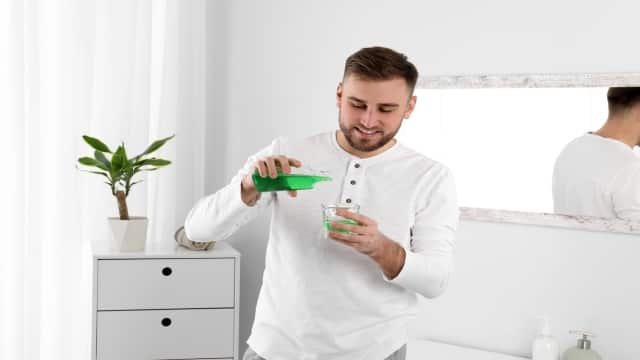-
-

FLUORIDE
What Is Stannous Fluoride Toothpaste?Discover what is Stannous Fluoride Toothpaste and its importance to prevent cavities and other oral health problems.

TEETH WHITENING
Whitening toothpaste - hydrogen peroxide vs. carbamide peroxideIf you lose one or more of your front teeth due to injury or decay, you may feel ...
-
Science & InnovationOral Health Commitment
- Oral Health Commitment
- Bright Smiles, Bright Futures
- Educational Resources
- Mobile Dental Van
- Volunteer
- ORAL HEALTH CHECK
- PRODUCT MATCH
- Oral Health and Dental Care | Colgate®
- Oral Health
- Soft Vs. Hard Toothbrush: Which One Should You Use?


Toothbrushes were invented hundreds of years ago, using natural materials like twigs and animal hair for the bristles. Thankfully, we have way better choices now. Today, there are several different toothbrush options, including toothbrushes with soft bristles and hard bristles. Learn about soft-bristled toothbrushes, why experts prefer them to hard-bristled toothbrushes, and distinguish between the soft bristle types.
What are the different toothbrush bristle types?
There are typically three kinds of soft-bristle toothbrushes available in stores, extra-soft, soft and medium-soft. Hard-bristled toothbrushes—often called firm-bristles toothbrushes on the packaging—are not commonly found in stores because most dental professionals recommend toothbrushes with soft bristles. They especially recommend soft-bristle toothbrushes if you have sensitive teeth or signs of erosion. There are so many bristle options for toothbrushes, including:
- Bristle firmness
- The angle of the bristles
- Number of layers of bristles
Which toothbrush is best: soft-bristle or hard-bristle toothbrush?
Dental professionals recommend soft-bristle toothbrushes because too much pressure or overzealous brushing can negatively impact the enamel and gums. The American Dental Association (ADA) recommends soft-bristle toothbrushes with angled or multi-layer bristles to ensure an excellent clean without harming your teeth. If you feel like your toothbrush bristles are too soft, you can try the following options:
- Angled bristles to get into nooks and crannies
- Electric toothbrush for extra oomph
- Multiple layered bristles
Powered toothbrushes tend to come with heads with soft bristles because the rotation and vibration tend to add extra pressure to your teeth already, without needed firm bristles.
How to choose a soft or hard-bristled toothbrush
You should choose the type of toothbrush that will be easy and comfortable to use at least twice a day. There are many different options between manual and electric toothbrushes. However, dentists' consensus is to choose soft-bristled toothbrushes, especially if you tend to push harder against your teeth. More pressure does not equal cleaner teeth, and in fact, can cause gum loss, which can contribute to tooth sensitivity. It may start to damage the enamel and tissues around your teeth.
If you feel like you're not getting a thorough clean with your toothbrush, talk to your dental hygienist or dentist about which toothbrush is best for you.
This article is intended to promote understanding of and knowledge about general oral health topics. It is not intended to be a substitute for professional advice, diagnosis or treatment. Always seek the advice of your dentist or other qualified healthcare provider with any questions you may have regarding a medical condition or treatment.
Related Articles

Selecting dental products
5 Benefits Of Chewing GumDid you know that there are benefits of chewing gum? Learn more on how gum may improve your oral health.

Selecting dental products
Dental Technology: 3D Printed Teeth And MoreIts exciting applications for dental care include custom 3D printed teeth, dentures and a variety or other tools for patients and practitioners

Selecting dental products
Benefits Of Cetylpyridinium Chloride MouthrinseMouthrinse can be a good addition to your oral care routine. Here's why your dentist may recommend one containing cetylpyridinium chloride.

Selecting dental products
CBD and Oral Care. Are There Benefits?If you're interested in incorporating CBD charcoal toothpaste & CBD mouthwash into your oral care routine read this article from Colgate.
Related Products

Colgate Total Active Prevention Whitening Toothbrush is a soft toothbrush with charcoal infused spiral and Floss-Tip bristles (1). This soft bristle toothbrush fights the root cause* of cavities, plaque, gingivitis, bad breath, tartar buildup**, and stains*** and also helps remove surface stains to prevent stain buildup.

Power away plaque with Colgate Total Battery Powered Toothbrush. This battery operated toothbrush for adults fights the root cause* of cavities, plaque, gingivitis, bad breath, tartar buildup**, and stains***. Plus, this battery toothbrush has a built in 2 minute timer and features two cleaning modes, Sensitive and Regular, to cater to your unique oral care needs.

The Colgate Total® Active Prevention Foaming Clean Soft Bristle Toothbrush is specially designed to tackle the root cause* of cavities, plaque, gingivitis, bad breath, tartar buildup**, and stains***.

Colgate Total Alcohol Free* Gum Health Mouthwash delivers 24-hour protection** against bacteria and also helps prevent gum problems

Helping dental professionals
More professionals across the world trust Colgate. Find resources, products, and information to give your patients a healthier future




